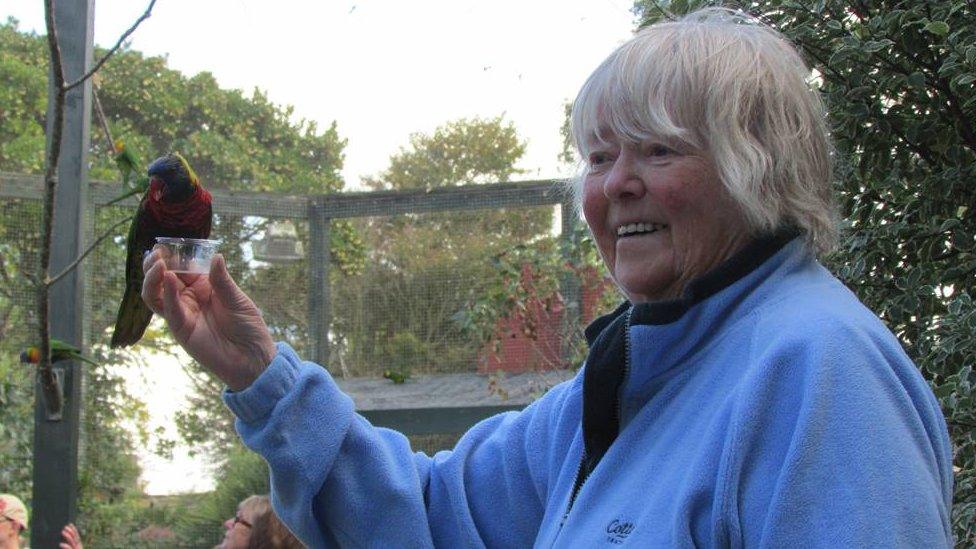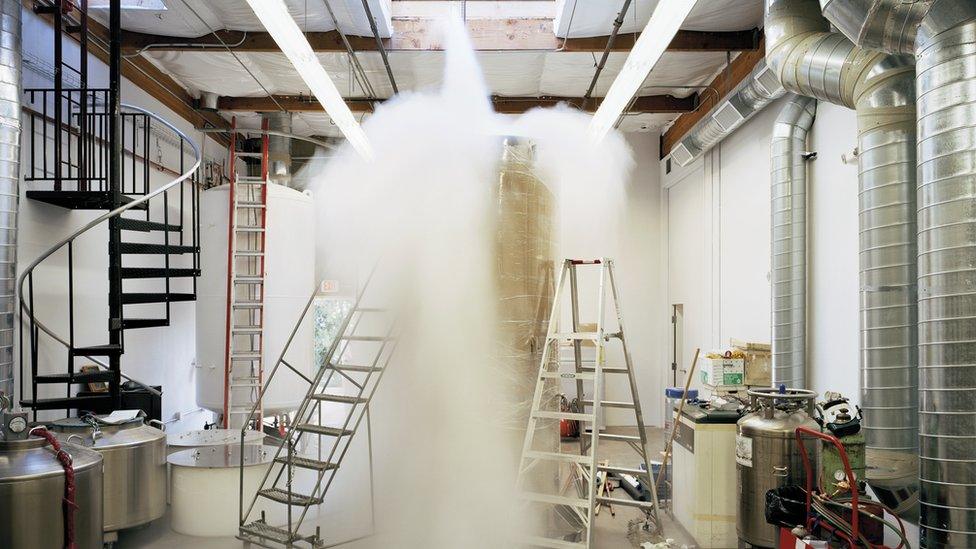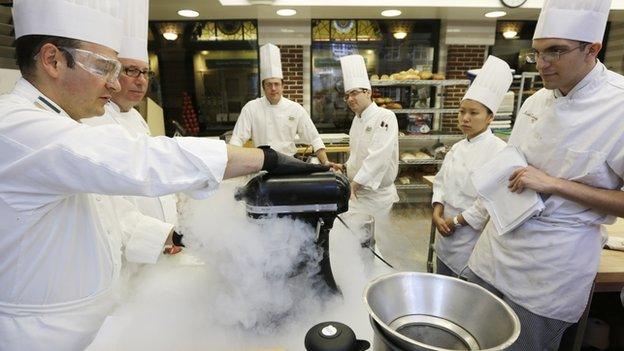Cryonics: The people who believe in a chance to come back
- Published

Chrissie de Rivaz and her husband John have saved almost £65,000 to be cryogenically preserved when they die
A court has said a terminally-ill 14-year-old girl could have her body cryogenically preserved in the hope she could later be brought back to life. What do people who make this choice expect?
"I know it is a very slim chance, but however long you live is never long enough," says Chrissie de Rivaz, from Cornwall, of the prospect that technology may one day be able to revive her lifeless body.
She has saved up the £28,000 to be preserved when she dies, as has her husband John. Added to the additional costs to fly them to the US after their deaths, the total is close to £65,000.
"The idea originally came from my husband," said the 76-year-old. "He talked about it quite a lot and I thought, 'Yuck, it sounds horrible and I just don't want to know.'
'Chance to come back'
"But then he sent me literature, I read it through and I thought it is not quite so horrible after all. In fact they are very caring with their patients. That was about 25 years ago and I have been signed up ever since."
Mrs de Rivaz does not want to persuade anyone else to do it and believes it is a personal choice, but one she wants to take.
"I can't see any reason to just send me up the flume and I hate the idea of being buried in the ground, so why not take this chance to come back again?"
"I have three sons and they do think we are bonkers," Mrs de Rivaz said.
"But they are very supportive and know it is what we want to do. It has to be your decision and they know that."

Cryogenic preservation: How does it work?
The process needs to begin as soon as possible after the patient dies, to stop brain cells dying through lack of oxygen
Bodies are first cooled in ice baths to slowly reduce the body temperature
Blood is removed from the body and replaced with cryo-protectant fluid, stopping ice crystals forming inside, which in turn damages cells
The bodies are transferred for storage - only companies in the US and Russia do this at present
The companies put the person into an arctic sleeping bag and lower them into a giant tank, where their temperature continues to be lowered
Whole bodies or just heads can be preserved, as well as pets
Scientists have yet to prove they will be able to bring them back to life

"Hopefully they will be able to bring John back too or I won't know anybody," says Mrs de Rivaz. "But if not, I think I will survive on interest.
"I think of how much we love looking back at history and archaeology. I think the interest in the future will be even stronger.
"I hope to live for a lot longer as I am, but there is that chance if I take this choice."

Vessel for preserved bodies is charged with liquid nitrogen. It costs thousands, but people are willing to invest in science bringing them back to life
Tim Gibson is another Briton set on being preserved after he dies.
"I have wanted to do it since I heard the story about Walt Disney doing it," he said.
"I later found out that wasn't true, but then I saw a documentary when I was about 19 and thought, 'That is fabulous, I want that to happen with me.'"
'It starts to seem wacky'
He is a committee member of Cryonics UK, an organisation which aims to provide assistance to those "who wish for their body to be cryopreserved upon 'death'" - and adds that the inverted commas round "death" are intentional.
By the time he turned 20, Mr Gibson had discovered you could pay for the procedure through life insurance and was signed up before his 21st birthday.
However, unlike Mrs de Rivaz, he will not be having his whole body preserved after his death.
"Originally I wanted that, but I had a few issues with my insurance and now I have gone for neurological freezing, where they only freeze your head," he said.
"When they get to the stage they can build you a whole new body, all they need is the brain and the DNA.
"I know it starts to seem wacky then, but think about it. If they have all the data there, then they just need to transfer it."
BBC Inside Out follows a group of people who are making plans to be frozen when they die so they can be brought back to life in the future
Mr Gibson, who is now 46 and lives in Sheffield, is not just a signed-up member for his own future, but helps prepare bodies so they can be transferred to the US.
The team likes to be there before the death so it can get to work as soon as possible, including keeping the heart pumping so the brain continues to get oxygen and slowly cooling down the body before it goes into surgery to have blood drained and replaced with chemicals.
Mr Gibson does not have a medical background, but has completed two week-long courses in the US to be able to carry out the procedure, as well as a number of weekend training sessions in the UK.
"The first time it is freaky," he said. "That lasts for two or three times really, but then you harden to it. You really learn by getting your hands dirty and doing it. Now I have done 12 cases, 10 of which were in the UK."
So how does he feel about the prospect of waking up in a different time?
"It is like going on holiday," said Mr Gibson. "I wasn't born prepared for this life I am in, I was brought up in the house and with the people I live with now. You adjust, you get used to it, and I am sure I will again."
- Published3 December 2010
- Published9 October 2012
